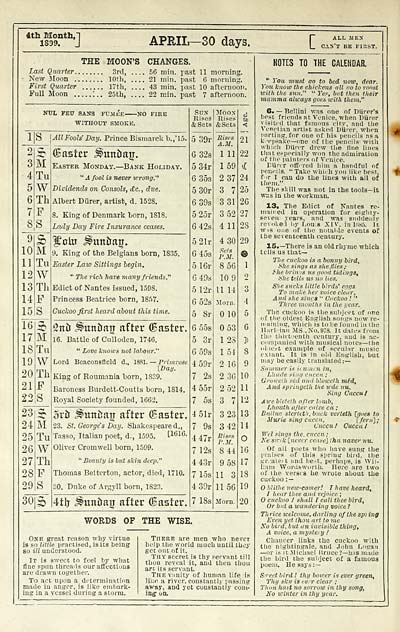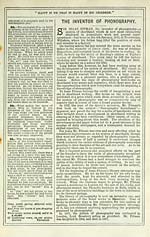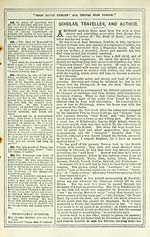Towns > Dalkeith > 1899, 1902 - Carment's directory for Dalkeith and district and year book > 1899
(140)
Download files
Complete book:
Individual page:
Thumbnail gallery: Grid view | List view

4th Month,!
1899. J
APRIL— 30 days.
ALL MEN
CAX'T BE FIRST.
TEE MOON'S CHANGES
Last Q uarter Srd, . .
New JEoon 10th, ..
First Quarter I7th, . .
Full Moon ;.. 25th, .,
56 mill, past 11 moriiirig.
21 min. past 6 nionung.
43 min. past 10 afternoon.
22 min. past 7 afternoon.
NTJL FEU SANS FDMj5e NO FIRE
WITHOUT SMOKE.
1|S
2
3
M
4
Tu
5
W
6
Th
7
F
8S
9
10
M
11
Tu
12
W
13
Th
14
F
15
S
16
17
5
M
18
Tu
19
W
20
Th
21
F
22
S
23
24
M
25
Tu
26
W
27
Th
28
F
29
S
9. King of the Belgians born, 1S35.
Easter Law Sittings begin.
" The rich have many friends."
Edict of Nantes issued, 1598.
Princess Beatrice born, 1857.
Cuckoo first heard about this time.
30|^
AllFools' Day. Prince Bismarck b.,'15. 5
faster ^ittt&a^.
Easteb Monday.— Bank Holiday.
" A fool is never wrong."
Dividends on Consols, dc, due.
Albert Durer, artist, d. 1528.
8. King of Denmark born, 1818.
Lady Day Fire Insurance ceases.
2ttii ^untra^ after Chaster.
16. Battle of Culloden, 1746.
" Love knows not labour."
Lord Beaconsfleld d., 18?rl. — Primrose
[Dajj.
King of Roumania born, 1839.
Baroness Burdett-Coutts born, 1814.
Royal Society founded, 1662.
5rtr ^utttJau after (B aster,
23. St. George's Day. Shakespeare d.,
Tasso, Italian poet, d., 1595. D-^'i-^-
Oliver Cromwell born, 1599.
"■Beauty is hut skin deep."
Thomas Beltcrton, actor, died, 1710.
SO. Duke of Argyll born, 1823.
4tlT ,^«ttirau after faster.
Sun
Rises
&Scts
Moon
Rises
&Sets
5 39r
Risps
A.M.
6 32s
1 11
5 34r
159
6 35s
2 37
5 30r
3 7
6 39s
3 31
5 25r
3 52
6 42s
4 11
5 21r
4 30
6 45s
Sets
P.M.
5 16r
8 56
6 49s
10 9
5 121-
U 14
6 52s
Morn.
5 8r
10
6 55s
53
5 3r
128
6 59s
154
4 59r
2 16
7 2s
2 36
4 55r
2 52
7 5s
3 7
4 51r
3 23
7 9s
3 42
4 47r
Rises
P.M.
7 12s
8 44
4 43r
9 58
7 1os
11 3
4 39r
1156
7 18s
Morn.
WORDS OF THE WISE.
One great reason why virtue
is so little practised, is its being
so ill understood.
It is sweet to feel by what
fine spini threads our affections
are drawn together.
To act upon a determination
made in anger, is like embark-
ing in a vessel during a storm.
TuERE are men who never
help the world much until they
get out of it.
Thy secret is thy servant till
thou reveal it, and then thou
art its servant.
THEViinity of human life is
like a river, constantly passing
away, and yet constantly com-
ing- on.
NOTES TO THE CALENDAR.
lOM must ao to led now, dear.
You know the chickens all ao to roost
icith the stm." " Yes, but then their
mamma always goes with them."
6. — Bellini was one of PUrer's
best friends at Venice, when Diirer
visited that fHuious city, and the
Venetian nrtist asked Diirer, when
imrting, for one of his pencils nsa
k'epsako— one of the pencils' with
which Diirer drew the fine lines
that especially won the admiration
of the painters of Venice.
Diirer offered liim a handful of
pencils. "Take whiih you like best,
fir I can do the lines with all of
them."
The skill was not in the tools— it
was iu the workman.
13, The Edict of Nantes re-
mained in operation for eighty-
seven years, and was suddenly
revoked hy Louis XiV. in lii8.5. It
WIS one of the notalde events of
the seventeenth century.
15.— There is an old rhyme which
tells us that—
The cuckoo is a bonny bird,
.S7ie sings as she flies ;
fhe brin'is us good tidings,
Hhc tells us no lies.
She sucks little birds' eggs
To make her voice clear.
And she sines '• Cuckoo ! "
Three months in the year.
Tlie cuckoo is the subject of one
of the oldest English songs now rc-
ii'Mining, which is to be found in the
ll.-irl"ian MS.,No.978. It dates from
thi: thii'teenth century, and is ac-
compauied with musical notes— the
obiert example of secubir music
c.xiant. It is in old ICiiglish, but
may be easily translated:—
Sinnnicr is icu;ncn in,
Lhude sing caeca ;
Groicelh sed an.d bloiceth m(d.
And springeth the wde nu.
Sing Cuccul
A we bletclh after lomb,
Lhouth after calve cu ;
Dalluc stertitli, buck verteth [goes to
Murie sing cuccn, Iferu'];
Vuccul Cuccut
Wei sings the. cuccu:
Ke swiic Inevcr ceas^e] Ihu naver nu.
0£ all poets who have sung tlie
praises of this spring birdi the
gr^ateit ;ind best, perhaps, is \Vii-
liani Wordsworth. Here are two
of the verses he wrote about the
cuckoo :—
blithe neic-comer! T have heard,
I hear thee and rejoice ;
cuckoo I shall I call thee bird,
Or but a wandering voice ?
Thrice icelcome, darling of the spi ing
Even yet thou art to me
No bird, but an invisible thing,
A voice, amysteiy J
Chaucer links the cuckoo with
the nightingale, and John Logan
—or is It JNIichael Uruce?— h.is made
the bird the suliject of a famous
poem. He says :—
Sireet bird ! thy boicer is ever green.
Thy sky is iw. r clear ;
Thiiu hatt no sorrow in thy song,
No ivinter in thy year.
1899. J
APRIL— 30 days.
ALL MEN
CAX'T BE FIRST.
TEE MOON'S CHANGES
Last Q uarter Srd, . .
New JEoon 10th, ..
First Quarter I7th, . .
Full Moon ;.. 25th, .,
56 mill, past 11 moriiirig.
21 min. past 6 nionung.
43 min. past 10 afternoon.
22 min. past 7 afternoon.
NTJL FEU SANS FDMj5e NO FIRE
WITHOUT SMOKE.
1|S
2
3
M
4
Tu
5
W
6
Th
7
F
8S
9
10
M
11
Tu
12
W
13
Th
14
F
15
S
16
17
5
M
18
Tu
19
W
20
Th
21
F
22
S
23
24
M
25
Tu
26
W
27
Th
28
F
29
S
9. King of the Belgians born, 1S35.
Easter Law Sittings begin.
" The rich have many friends."
Edict of Nantes issued, 1598.
Princess Beatrice born, 1857.
Cuckoo first heard about this time.
30|^
AllFools' Day. Prince Bismarck b.,'15. 5
faster ^ittt&a^.
Easteb Monday.— Bank Holiday.
" A fool is never wrong."
Dividends on Consols, dc, due.
Albert Durer, artist, d. 1528.
8. King of Denmark born, 1818.
Lady Day Fire Insurance ceases.
2ttii ^untra^ after Chaster.
16. Battle of Culloden, 1746.
" Love knows not labour."
Lord Beaconsfleld d., 18?rl. — Primrose
[Dajj.
King of Roumania born, 1839.
Baroness Burdett-Coutts born, 1814.
Royal Society founded, 1662.
5rtr ^utttJau after (B aster,
23. St. George's Day. Shakespeare d.,
Tasso, Italian poet, d., 1595. D-^'i-^-
Oliver Cromwell born, 1599.
"■Beauty is hut skin deep."
Thomas Beltcrton, actor, died, 1710.
SO. Duke of Argyll born, 1823.
4tlT ,^«ttirau after faster.
Sun
Rises
&Scts
Moon
Rises
&Sets
5 39r
Risps
A.M.
6 32s
1 11
5 34r
159
6 35s
2 37
5 30r
3 7
6 39s
3 31
5 25r
3 52
6 42s
4 11
5 21r
4 30
6 45s
Sets
P.M.
5 16r
8 56
6 49s
10 9
5 121-
U 14
6 52s
Morn.
5 8r
10
6 55s
53
5 3r
128
6 59s
154
4 59r
2 16
7 2s
2 36
4 55r
2 52
7 5s
3 7
4 51r
3 23
7 9s
3 42
4 47r
Rises
P.M.
7 12s
8 44
4 43r
9 58
7 1os
11 3
4 39r
1156
7 18s
Morn.
WORDS OF THE WISE.
One great reason why virtue
is so little practised, is its being
so ill understood.
It is sweet to feel by what
fine spini threads our affections
are drawn together.
To act upon a determination
made in anger, is like embark-
ing in a vessel during a storm.
TuERE are men who never
help the world much until they
get out of it.
Thy secret is thy servant till
thou reveal it, and then thou
art its servant.
THEViinity of human life is
like a river, constantly passing
away, and yet constantly com-
ing- on.
NOTES TO THE CALENDAR.
lOM must ao to led now, dear.
You know the chickens all ao to roost
icith the stm." " Yes, but then their
mamma always goes with them."
6. — Bellini was one of PUrer's
best friends at Venice, when Diirer
visited that fHuious city, and the
Venetian nrtist asked Diirer, when
imrting, for one of his pencils nsa
k'epsako— one of the pencils' with
which Diirer drew the fine lines
that especially won the admiration
of the painters of Venice.
Diirer offered liim a handful of
pencils. "Take whiih you like best,
fir I can do the lines with all of
them."
The skill was not in the tools— it
was iu the workman.
13, The Edict of Nantes re-
mained in operation for eighty-
seven years, and was suddenly
revoked hy Louis XiV. in lii8.5. It
WIS one of the notalde events of
the seventeenth century.
15.— There is an old rhyme which
tells us that—
The cuckoo is a bonny bird,
.S7ie sings as she flies ;
fhe brin'is us good tidings,
Hhc tells us no lies.
She sucks little birds' eggs
To make her voice clear.
And she sines '• Cuckoo ! "
Three months in the year.
Tlie cuckoo is the subject of one
of the oldest English songs now rc-
ii'Mining, which is to be found in the
ll.-irl"ian MS.,No.978. It dates from
thi: thii'teenth century, and is ac-
compauied with musical notes— the
obiert example of secubir music
c.xiant. It is in old ICiiglish, but
may be easily translated:—
Sinnnicr is icu;ncn in,
Lhude sing caeca ;
Groicelh sed an.d bloiceth m(d.
And springeth the wde nu.
Sing Cuccul
A we bletclh after lomb,
Lhouth after calve cu ;
Dalluc stertitli, buck verteth [goes to
Murie sing cuccn, Iferu'];
Vuccul Cuccut
Wei sings the. cuccu:
Ke swiic Inevcr ceas^e] Ihu naver nu.
0£ all poets who have sung tlie
praises of this spring birdi the
gr^ateit ;ind best, perhaps, is \Vii-
liani Wordsworth. Here are two
of the verses he wrote about the
cuckoo :—
blithe neic-comer! T have heard,
I hear thee and rejoice ;
cuckoo I shall I call thee bird,
Or but a wandering voice ?
Thrice icelcome, darling of the spi ing
Even yet thou art to me
No bird, but an invisible thing,
A voice, amysteiy J
Chaucer links the cuckoo with
the nightingale, and John Logan
—or is It JNIichael Uruce?— h.is made
the bird the suliject of a famous
poem. He says :—
Sireet bird ! thy boicer is ever green.
Thy sky is iw. r clear ;
Thiiu hatt no sorrow in thy song,
No ivinter in thy year.
Set display mode to: Large image | Transcription
Images and transcriptions on this page, including medium image downloads, may be used under the Creative Commons Attribution 4.0 International Licence unless otherwise stated. ![]()
| Scottish Post Office Directories > Towns > Dalkeith > Carment's directory for Dalkeith and district and year book > 1899 > (140) |
|---|
| Permanent URL | https://digital.nls.uk/86551316 |
|---|
| Description | Annual. Published 1899-1902. Preceded by: Carment's ... directory for Dalkeith and district. |
|---|---|
| Shelfmark | 5.1429 |
| Additional NLS resources: |
| Description | Directories of individual Scottish towns and their suburbs. |
|---|
| Description | Around 700 Scottish directories published annually by the Post Office or private publishers between 1773 and 1911. Most of Scotland covered, with a focus on Edinburgh, Glasgow, Dundee and Aberdeen. Most volumes include a general directory (A-Z by surname), street directory (A-Z by street) and trade directory (A-Z by trade). |
|---|


